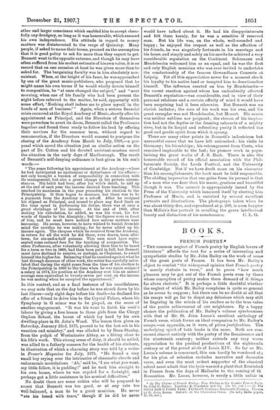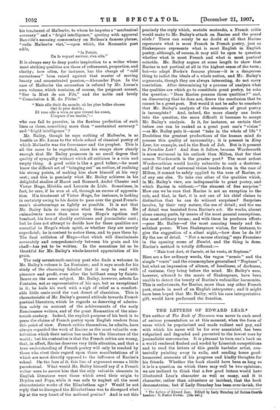BOOKS.
FRENCH POETRY.0 " THE common neglect of French poetry by English lovers of literature" affords the text for a series of interesting and sympathetic studies by Mr. John Bailey on the work of some of the great poets of France. It has been Mr. Bailey's object to combat "the widespread opinion that French poetry is merely rhetoric in verse," and to prove " how much pleasure may be got out of the French poets even by those whose conception of poetry makes them demand of it things far above rhetoric." It is perhaps a little doubtful whether the neglect of which Mr. Bailey complains is quite so general as he seems to suppose ; but there can be no doubt at all that his essays will go far to dispel any delusions which may still be lingering in the minds of his readers as to the true value of the poetic achievement of our neighbours. By a happy chance the publication of Mr. Bailey's volume synchronises with that of Mr. St. John Lucas's excellent anthology of French verse, which forms an ideal companion to Mr. Bailey's essays,—an appendix, as it were, of pCeees justificative& The underlying spirit of both books is the same. Both are con- cerned almost entirely with the poetry of the Renaissance and the nineteenth century ; neither extends any very warm appreciation to the poetical productions of the eighteenth century or of the grand siècle of Louis XIV. So far as Mr. Lucas's volume is concerned, this can hardly be wondered at ; for his plan of selection excludes narrative and dramatic verse, and even the most ardent supporter of the classical school must admit that the lyric was not a plant that flourished in France from the days of Malherbe to the coming of th Romantics. Mr. Lucas, however, is surely a little unfair in 1, (1) The Claims of French Poetry : Nine Studies in the Greater French Poets. By John C. Bailey. London: A. Constable and Co. [7s. 6d. net.]—(2) The Orford Book of Trench VOW: Thirteenth Century—Nineteenth Century. Chosen by St. John Lucas. Oxford : at the Clarendon Press. [6s. net ; India payer, 7s. 6d. net.]
his treatment of Malherbe, to whom he imputes a " mechanical accuracy" and a " frigid intelligence," quoting with approval Banvilles amusing -commentary on Boileau's famous phrase, " enfm Malberbe vint,"—upon which, the Romantic poet adds, "la Poesie, En to voyant arriver, s'en alla."
It is always easy to deny poetic inspiration to a writer whose most striking qualities are those of refinement, proportion, and clarity; how often, for instance, has the charge of " cold correctness " been raised against that master of moving beauty and concentrated passion,—Alexander Pope. In the case of Malherbe the accusation is refuted by Mr. Lucas's own volume, which contains, of course, the poignant sonnet, " Sur ls. Mort de son Fils," and the noble and lovely " Consolation I M. .du Perier."
" Male elle etaitalu monde, ob. les plus belles choses Oat le pire dentin; Et rose elle a vecu ce que vivent les roses, L'espaco d'un matin,"— who can fail to perceive, in the flawless perfection of such lines as these, something more than " mechanical accuracy " and "frigid intelligence" ?
Mr. Bailey, though he says nothing of Malherbe, is as hostile as Mr. Lucas to the whole school of classical poetry of which Malherbe was the forerunner and the prophet. This is all the more to be regretted, since his essays show clearly enough that Mr. Bailey possesses in no small degree that quality of sympathy without which all criticism is a vain and empty thing. A good critic is like a good talker,—he must know the difficult art of "bringing out" an author, of realising his strong points, of making him show himself at his very oest ; and this is precisely what Mr. Bailey achieves in his delightful studies of Marot and Ronsard, Andre Chenier and Victor Hugo, Heredia and Leconte de Lisle. Sometimes, in fact, he errs, if he errs at all, through an excess of apprecia- tion. His treatment of Victor Hugo, for instance, is lacking in certainty owing to his desire to pass over the great French- man's shortcomings as lightly as possible. It is not that Mr. Bailey fails to recognise what these faults are. He animadverts more than once upon Hugo's egotism and bombast, his love of shoddy antitheses and journalistic cant ; but he does not attempt to decide how far these qualities are essential to Hugo's whole spirit, or whether they are merely superficial; he is content to notice them, and to pass them by. The final criticism of Hugo—that which will discriminate accurately and comprehensively between his grain and his chaff—has yet to be -written. In the meantime let us be thankful. for Mr. Bailey's whole-hearted appreciation of his grain.
The only seventeenth-century poet who finds a welcome in Mr. Bailey's volume is La Fontaine; and it says much for his study of the charming fabulist that it may be read with pleasure and profit, even after the brilliant essay by Sainte- Beuve on. the same subject. Mr. Bailey, however, selects La Fontaine, not as representative of his age, but as exceptional in it; he hails his work with a sigh of relief as a comfort- able little oasis amid the vast desert of classicism. This is characteristic of Mr. Bailey's general attitude towards French poetical literature, which he regards as deserving of admira- tion solely on account of the achievements of the early Renaissance writers, and of the great Romantics of the nine- teenth century. Indeed, the explicit purpose of his book is to press the claims of French poetry upon English readers from this point of view. French critics themselves, he admits, have always. regarded the work of Racine as the most valuable con- tribution which their nation has made to the literature of the world ; but his contention is that the French critics are wrong, that, in effect, Racine deserves very little attention, and that a true understanding of French poetry will only be reached by those who rivet their regard upon those manifestations of it which are most directly opposed to the influence of Racine's school. On the face of it, this line of argument seems a little paradoxical. What would Mr. Bailey himself say if a French writer were to assure him that the only valuable elements in English literature were those which owed their origin to Dryden and Pope, while it was safe to neglect all the most characteristic works of the Elizabethan age ? Would he not reply that to disregard the Elizabethans was to disregard what lay at the very heart of the national genius ? And is not this precisely the reply which, mutatis mutandis, a French critic would make to Mr. Baileykaattack on Racine and the grand siecle ? There can surely be no doubt at all that Racine represents what is most French in French poetry, just as Shakespeare represents what is most English in English poetry, although, of course, it may still be open to question whether what is most French and what is most poetical coincide. Mr. Bailey argues at some length- to show that Racine is not poetical at all in the highest sense.of the term`; but—to adapt Burke's famous phrase—it is a dangerous thing to indict the ideals of a whole nation, and Mr.. Bailey's arguments, though they are always interesting, do not curry conviction. After determining by a process of analysis what the qualities are which go to constitute great poetry, he asks the question: "Does Racine possess these qualities ?" and, on 'discovering that he does not, draws the conclusion that lee cannot be a great poet. But would it not be safer 'to conclude that Mr. Bailey's analysis of the -elements of great poetry is incomplete? And, indeed, the more closely one looks into the question, the more difficult it becomes to accept Mr. Bailey's analysis. Is it, for instance, so certain that before one can be ranked as a great poet one's "vision" —as Mr. Bailey puts it—must "take in the whole of life" ? Doubtless the greatest productions of the human mind do possess this quality of universality; it is present in King Lear, for example, and in the Book of Job. But is it present in Paradise Lost ? And does it follow, because Wordsworth is more universal in his outlook than Milton, that for that reason Wordsworth is the greater poet? The most ardent Wordsworthian would hardly subscribe to such a-doctrine; and if the test of universal 'vision breaks down in the case of Milton, it cannot be safely applied to -the ease of Racine, or of any one else. To . take one other of the qualities which, in Mr. Bailey's view, are indispensable to great poetry, and which Racine - is without,—" the element of fine surprise." How can we be sure that Racine is not an exception to the rule, and that, in fact, it is not one of his chief claims to distinction that he can do without surprises ? Surprises involve, by their very nature, the use of detail; and the use of detail was banished from Racine's art. He works, almost alone among poets, by means of the most general conceptions, the most ordinary terms ; . and with these he produces effects —pace Mr. Bailey—of the most amazing beauty and the subtlest power. When Shakespeare wishes, for instance, to give the suggestion of a silent night,—how does be do it? By the use of detail. " Not a mouse stirring," says Francisco in the opening scene of Hamlet, and the thing is done. Racine's method is totally -different :—
"Mais tout dart, et l'armee, et les vents, et Neptune."
Here are a few ordinary words, the vague "armee" and the simple "vents" and the commonplace generalised "Neptune"; but what an impression of silence, of loneliness, of darkness, of vastness, they bring before the mind. Mr. Bailey's ears; however, attuned to the music of Shakespeare, have been unable to detect the beauty of Racine's unfamiliar harmonies. This is unfortunate, for Racine, more than any other French poet, stands in need of an English interpreter ; and it might have been hoped that Mr. Bailey, with his rare interpretative gift, would have performed the function.















































 Previous page
Previous page